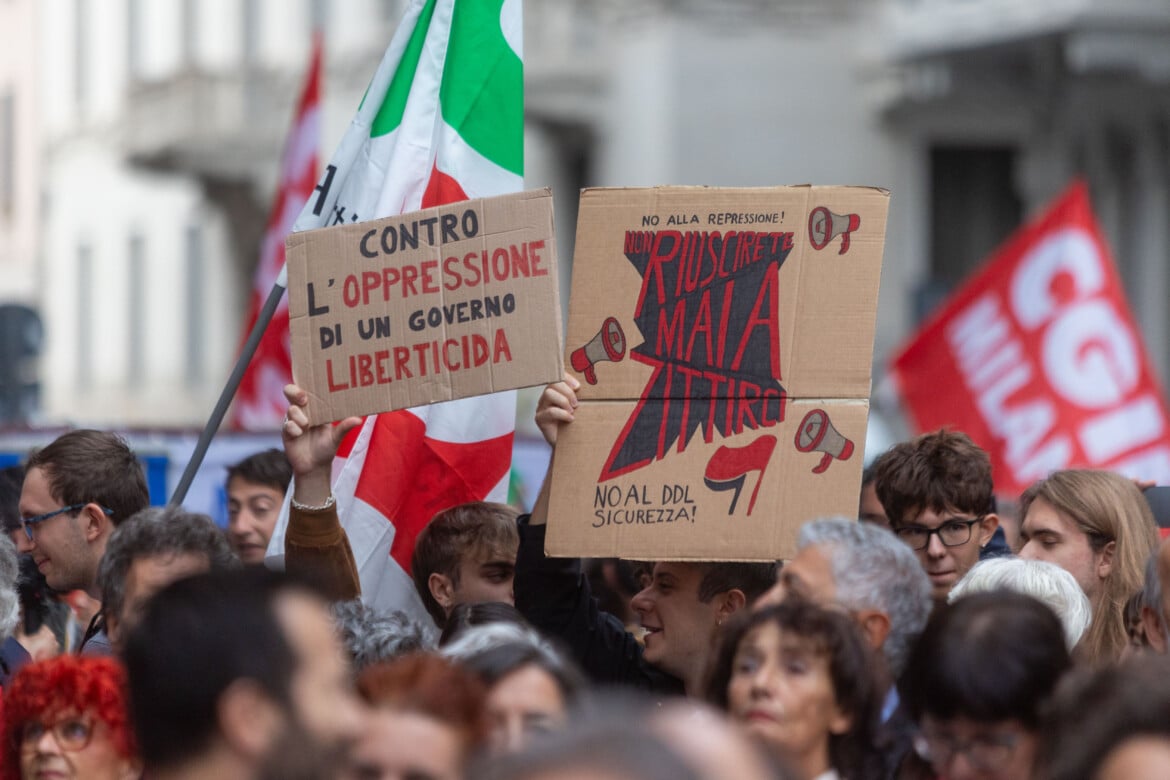Analysis
Right-wing coalition strains over Security Bill, ‘obviously unconstitutional’
The drop in the right-wingers' confidence in the bill may have arisen from the in-depth examination initiated by the President’s office with respect to possible elements of unconstitutionality. The Lega, however, is strongly opposed to any change in course.

There are serious tensions among the Italian government majority: the bone of contention is the Security Bill, whose inapplicability and dangerousness is becoming clearer every day, even to those who have turned it into a populist and illiberal banner to rally behind.
This is why on Wednesday, after an impromptu majority summit at Palazzo Madama, Minister for Relations with Parliament Luca Ciriani (FdI) announced that the text, currently still being discussed in the Senate's combined Constitutional Affairs and Justice committees, might be sent back to the Chamber of Deputies for a third reading, a significant step back.
The drop in the right-wingers' confidence in the bill may have arisen from the in-depth examination initiated by the President’s office with respect to possible elements of unconstitutionality. The Lega, however, is strongly opposed to any change in course: from its headquarters in Via Bellerio, it announced its official position that the omnibus package – against which very large parts of civil society and the productive class (especially in the north) are mobilizing in the streets – must be “passed immediately without wasting time.” From the Chamber came many indignant voices of Lega deputies who want to avoid a third reading at any cost.
At the moment, the scenario deemed most plausible is the postponement of a vote until January, after the budget law.
Interestingly, if we look beyond the outward bluster, the day had begun with an interview of Justice Undersecretary Andrea Ostellari (Lega) with the newspaper La Nuova, in which Ostellari had announced that an increase in penalties for home burglaries would be included in the same Security Bill with an amendment (which implies that the bill would go back to the Chamber).
“We want to raise the minimum and maximum penalties so that those who steal end up in jail. And we will also make reparations effective: if you steal, you go to jail and compensate for the damage,” he thundered.
Among the opposition parties, this looked like an attempt to put a fig leaf on the referral of the bill back to the Chamber in order to have a chance to repair the too-many legal errors contained in the text and the many norms that are “so obviously unconstitutional that on the first referral by a court, the judges of the Constitutional Court might not even have to bother meeting to discuss it,” according to a quip making the rounds.
The list of the bill’s “weak” points is almost as long as the list of new offenses and aggravating factors (twenty in all) that it contains. Some of them – “new mothers sent to prison and no SIM cards to migrants” – were mentioned by Minister Ciriani himself at the end of the majority summit in the Senate, also attended by Lega undersecretaries Molteni (Interior) and Ostellari (Justice), and the majority group leaders in the First and Second Standing Committees.
“We cannot exclude a third reading of the Security Bill,” Ciriani had to admit, while stressing that “no decision has been made”: ”we are looking into it, because there are different opinions, different sensitivities: no one wants to upend the contents of the text, but we have been dwelling on legal issues and some things need to be studied in depth,” the FdI minister said.
In reality, as we mentioned, the list of obvious critical issues is much longer than that. One clear example is Article 18 of the bill, which, in pursuit of the anti-cannabis prohibitionist obsession, has managed to put at risk the entire hemp production chain, “one of the segments of excellence among Made in Italy agro-industrial products,” which, as CIA-Agricoltori Italiani warns, risks being shut down “for exclusively ideological reasons.” On Wednesday, experts in the sector, especially from northern Italy, gathered in Rome to ask the government to change “a completely unfair measure.”
“Banning the cultivation, processing and sale of hemp buds and its derivatives,” explained CIA President Cristiano Fini, “is equivalent to wiping out the entire sector in one fell swoop, which is already worth 500 million in annual turnover and represents more than 15,000 jobs. It would make illegal a supply chain with high added value, which employs youth, and most importantly one with enormous productive and investment potential, including in cosmetics, herbal medicine, green building, floriculture, textiles and food, all uses widely recognized by EU regulations and which could generate up to €10 billion by 2030.”
Then, as PD Senator Alfredo Bazoli recalled, the bill also provides for “the generic aggravating circumstance for all crimes of any nature committed in train stations or on trains – one of the most obviously unconstitutional provisions. Not to mention the punishments for those who ‘cooperate’ in the occupation of a property; or the increased punishment for incitement to crime committed in writing and directed at detained persons; or the new crime of prison revolt that also includes passive resistance to orders,” including in juvenile correctional institutions. And the list goes on and on.
The PD hopes that, “for once, there will be a willingness on the part of the majority for a real dialogue leading to the rewriting of the text, and the grounds of law and reasonableness will prevail over those of ideology and propaganda,” said the PD senator.
+Europa and AVS have called for the complete withdrawal of the bill, which they call a “cynical propaganda tool of the right” and which, as Angelo Bonelli (Green Europe) stresses, “has nothing to do with security but represents an illiberal and authoritarian turn.”
Originally published at https://ilmanifesto.it/ddl-sicurezza-destra-in-tilt-possibile-rinvio-alla-camera on 2024-12-12
